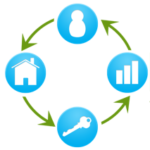 HomeKeeper is a Salesforce-based system for affordable homeownership organizations. It combines a day-to-day program management system with a shared measurement system. It is currently in use by over seventy organizations across the country. This post shares the history of how the HomeKeeper system came together over many years. The story is of local impact and taking social change to scale.
HomeKeeper is a Salesforce-based system for affordable homeownership organizations. It combines a day-to-day program management system with a shared measurement system. It is currently in use by over seventy organizations across the country. This post shares the history of how the HomeKeeper system came together over many years. The story is of local impact and taking social change to scale.
Background
A Community Land Trust (CLT) is a nonprofit that works in communities to create long-term affordable housing. The CLT holds the title to the land and leases it to the homeowners who live on the land. This removes the cost of the land from calculations of home price which, along with subsidies, then lowers the overall home cost. The homeowners are not renters; they own the home and build equity in it. When they go to sell the home, the lease requires them to keep the selling price affordable.
Some CLTs operate in cities and focus on sustainable urban housing where neighborhood gentrification displaces affordable housing options. Others work in rural areas to create affordable housing and affordable farmland. Some CLTs focus on housing in resort communities where local residents are pushed aside as expensive vacation homes begin to take over.
There are currently over 250 community land trusts in the United States. While every CLT is different, they all share one key characteristic: they handle an immense amount of data. They record and track land acquisitions, homes, home sales, homeowners, loans, grants, subsidies and real estate transactions on top of the day-to-day business of running a nonprofit. A single transaction creates a significant amount of data. Now imagine the paperwork for forty, eighty or one hundred transactions. You begin to understand the scope of the data management challenges.
A common vision and a simple agenda
 OPAL (Of People and Land) CLT was one of the first community land trusts in the West and is one of the most active CLTs. Since 1989, a small staff led by Executive Director Lisa Byers has worked to provide affordable housing on Orcas Island, one of the priciest communities in the Pacific Northwest. They belong to the Northwest Community Land Trust Coalition (NWCLTC). “[We] meet twice a year. We continually learn from each other and have built a strong bond of trust. A common thread was the challenge of tracking information. We all had stories of the positive effects affordable housing has on our communities but lacked easy access to the data to back up the stories. If we did have the data, it would take several people combing through spreadsheets and paper files to find the numbers to really show the impact. “
OPAL (Of People and Land) CLT was one of the first community land trusts in the West and is one of the most active CLTs. Since 1989, a small staff led by Executive Director Lisa Byers has worked to provide affordable housing on Orcas Island, one of the priciest communities in the Pacific Northwest. They belong to the Northwest Community Land Trust Coalition (NWCLTC). “[We] meet twice a year. We continually learn from each other and have built a strong bond of trust. A common thread was the challenge of tracking information. We all had stories of the positive effects affordable housing has on our communities but lacked easy access to the data to back up the stories. If we did have the data, it would take several people combing through spreadsheets and paper files to find the numbers to really show the impact. “
The frustrations at the local level were felt at the national level as well. The Urban Institute conducted a study of seven shared equity housing programs. The intro to the final 2010 report gives a high-level view of the difficulties in finding usable data:
The administrators were tasked with providing client-level data for every sale on housing prices, incomes, dates of home purchase, mortgage rates and terms, delinquencies and foreclosures, and other factors. Some sites maintained this information as administrative records in easily accessible electronic databases. Other sites undertook a labor-intensive process of searching hard-copy forms and county records to assemble this information…In some cases, we had access to a sample of homeowner records (for example, only those residents who had resold their home), while some sites were not able to provide information about some topics for any residents.
Even before the report came out, NWCLTC was starting conversations about the need for “good data.” Lisa recalls, “We had this common vision of a framework that would allow us do our work and measure outcomes at the local level, and at the same time, aggregate the data up to the state or national level. We didn’t know about the tools or how we could get it done, but we knew it was a good idea and that it could benefit the community land trust movement as a whole.”
Three CLTs in Washington state—OPAL, Homestead CLT in Seattle and Kulshan CLT in Bellingham—championed the project with support from the Northwest CLT Coalition and dedicated staff resources to get the project going.
Finding common ground

Sheldon Cooper, the executive director of Homestead CLT at the time, was part of the core development group. “We were all doing similar work but using different applications and different names for stuff. When you got into the details, it was unbelievable the amount of information we would have to actually deal with.” Lisa adds, “We had about fifty spreadsheets to track data, people and property — all in different ways. In 2007, we managed to get a grant for capacity building and chose a consultant to help us build the project.” HomeKeeper was born.
The team chose to build a system using the Salesforce platform. “It was a truly organic process. We all had different approaches to our processes. Instead of just sticking to our forms, we decided to take a shot at developing best practices. We were all willing to rethink how we worked if it could give us a unified set of data and approaches.” What followed was two years of meetings to hash out the details followed by product iterations, more meetings and more iterations. Both Lisa and Sheldon jokingly commented that if they knew how long and difficult the project would ultimately be, they would have thought twice about jumping in. But they are also very clear that the end goals—better day-to-day program management and shared measurement standards—was worth all the hard work.
To be successful on a project such as this, you need to bring together subject matter experts from several programs and equally capable technical experts. The important, and time-consuming, part of the process involves coming to a shared understanding of the requirements and agreement on prioritization of the features.
A new champion steps in
As the project progressed, it caught the attention of Capital Impact Partners. Capital Impact is a national funder focused on programs that create a high quality of life for low-income people and communities. Affordable housing is a key goal and they saw the need for a shared-measurement system on a national level. Sheldon (of Homestead CLT) sums up Capital Impact’s involvement: “They came in at a critical time. We had a working prototype, but we are small organizations and had run out of resources to devote to the project. Capital Impact brought the financial resources, dedicated staff, and a national focus.”
The project quickly moved from a local effort to something much bigger. Cornerstone Partnership, a program of Capital Impact Partners, took over HomeKeeper with funding provided by the Ford Foundation and, later, by Salesforce.org’s Force for Change grant program. The Cornerstone Partnership is a peer network for homeownership programs that preserve long-term affordability and community stability. Charter members to the partnership include Habitat for Humanity International and the Community Land Trust Network. Cornerstone’s national perspective moved the prototype individual databases into a single solution that could be easily setup for use by any program managing homes with long-term affordability contracts.
There are several components to the system. HomeKeeper is the Salesforce-based operational system used by individual homeownership programs to track their day-to-day program work. This component alone has allowed participating programs to more efficiently and effectively manage their work.
 Key local property and transaction data from each operational system feeds into the HomeKeeper National Data Hub, an aggregated national sector performance data system. It crunches those numbers and produces dynamic reports for the participating organizations that show their program benchmarked against their peers. HomeKeeper is currently in use by over 115 organizations across the country.
Key local property and transaction data from each operational system feeds into the HomeKeeper National Data Hub, an aggregated national sector performance data system. It crunches those numbers and produces dynamic reports for the participating organizations that show their program benchmarked against their peers. HomeKeeper is currently in use by over 115 organizations across the country.
“Standards for collecting data or tracking outcomes for affordable ownership programs have been non-existent in the past,” explains Tiffany Eng, Director of HomeKeeper. “Each organization decides how they are going to track information. When programs across the country are collecting different data points, it’s difficult to compare a program to their peers and to the field as a whole. HomeKeeper changes this. By standardizing on how we measure data, local programs impact national efforts.”
The collective impact on affordable housing
At the local level, affordable housing organizations like CLTs can better identify and respond to trends both in their programs and in the industry as a whole. They can strengthen their quantitative reporting to funders, investors, and other local stakeholders. For the first time, they can give funders hard numbers on the social impact of their investment in affordable homeownership. Best practices are no longer isolated to a few local organizations; they are part of the national dialogue. Tiffany points out, “By providing feedback on relative performance, we hope to encourage programs to more actively seek out information about why some programs are producing stronger outcomes. We expect this to lead to more widespread adoption of best practices.” The data empowers affordable housing advocates to raise awareness and influence policy.
Today, HomeKeeper is also being used by Habitat for Humanity affiliates, other affordable housing nonprofits, and city housing departments. The efforts of a small group of local advocates have become a full-blown effort to change the way people think about, talk about and influence affordable housing in their local communities and on the national political stage. When asked why this data is critical to her success, Lisa Byers at OPAL says, “It’s all about being able to tell a story. If we don’t have the data, it’s hard to tell a story that will influence public opinion or our policy makers.” If data does create information, which in turn creates knowledge, which leads to understanding, affordable housing advocates are well on their way to creating lasting and large-scale change.
Additional Information
- HomeKeeper website, including an overview of the social impact report and an interactive interface to view the social impact data
- HomeKeeper success stories from organizations such as Habitat for Humanity Greater San Francisco, Hello Housing, and the City of Cambridge, Massachusetts.
- Four keys to scaling a nonprofit solution – key lesson’s learned on projects, including HomeKeeper, that are working to scale nonprofit solutions to many organizations.
- Who will pay for data? Stanford Social Innovation Review article written by Rick Jacobus, a key player in the development of HomeKeeper. The article talks about funding options for systems like the HomeKeeper National Data Hub.
Project Credits
This project is the result of the collective effort of several organizations. The early vision of OPAL, Kulshan, Homestead, and the Northwest CLT Coalition paved the way for Capital Impact Partners and the Cornerstone Partnership to take it national. The work of Cornerstone Partnership has been integrated with the Community Land Trust Coalition into a new national nonprofit, Grounded Solutions Network. Along the way dozens of other affordable housing organizations have contributed their knowledge and expertise. On the system side, Bigger Boat Consulting built and led HomeKeeper development. Exponent Partners originally developed the HomeKeeper National Data Hub. Bigger Boat Consulting participated in latter parts of the development of the National Data Hub. Ongoing HomeKeeper enhancements are now led by DaizyLogik.